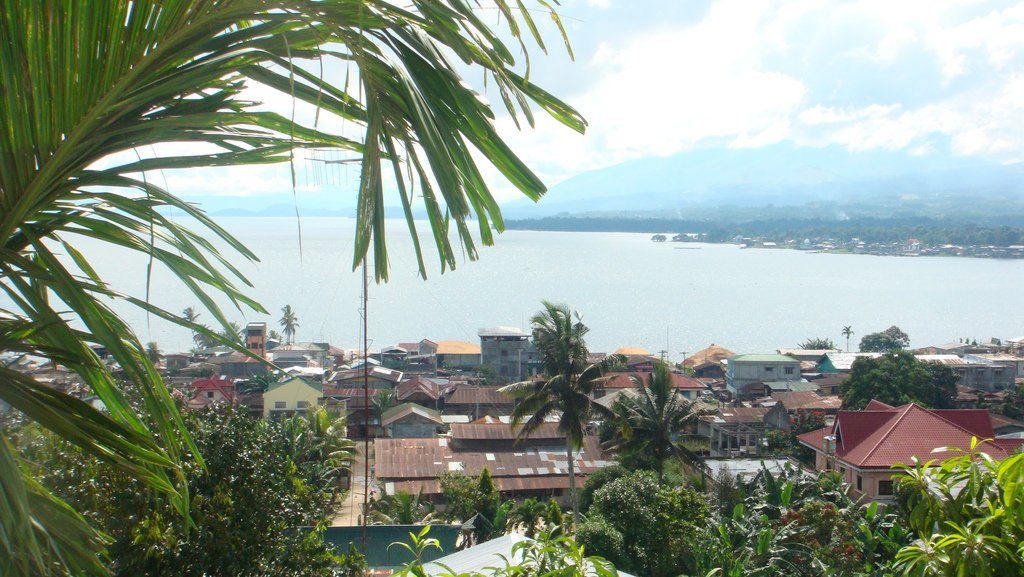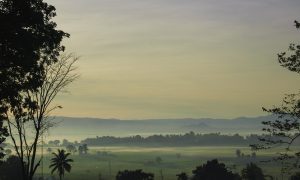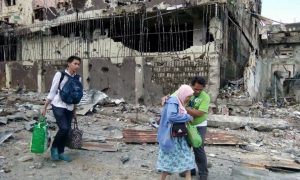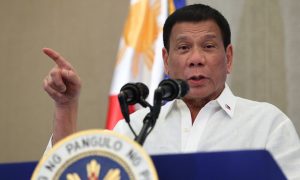As military operations in Marawi drag on, the enthusiasm prompted by promises about post-conflict rebuilding has been slowly dwindling. Yet one thing is certain: the military is not returning to the barracks soon. The Philippine Congress authorised President Rodrigo Duterte’s request to extend martial law in Mindanao until the end of this year. This move is clearly premised on the difficulties faced by security forces in obtaining full control of Marawi City, and containing the violence that has already spilled over into other areas.
Since President Duterte refused to negotiate with the Islamic militants, the fighting continues as the Maute Group fighters manage to evade the government security forces. Hostages remain unreleased despite the military’s successful reclaiming of the Grand Mosque. Meanwhile, press reports and expert analysis on the depth and breadth of the Maute Group’s transnational networks and operations have helped explain their ability to plan and stage a takeover of Marawi, and their sophistication in engaging in prolonged urban warfare.
While most agree that the threat of future attacks is high, preventing violent extremism by “winning the hearts and minds” of the local population is understandably at the core of the national government’s security agenda and rebuilding efforts. However, these efforts will likely fail if they do not constitute a decisive change in civilian–military relations, and if the government’s approach towards the Muslim communities remains significantly unchanged.
As Steven Rood has argued, violent extremism cannot be addressed by military means alone. Preventing violent extremism requires a sensitive understanding of the social context in which radicalism arises. Such sensitivity is hard to come by after armed violence, especially when, as I have previously outlined at New Mandala, mutual suspicion and glaring cultural and religious differences predate the present fighting. Developments over the last month or so have only underlined these facts, and highlighted new challenges.
First, community perceptions on violent extremism matter. Government actors found it alarming when child evacuees from Marawi described the Maute Group as “heroes”, prompting the military to suggest that these children should “undergo debriefing” to better understand the conflict situation. But efforts to shape locals’ opinions can be futile—and can even backfire—if responses to Maranao civilians’ expressions of sympathy for militants are not grounded in an understanding of why those sympathies arise.
Even if armed with a sophisticated understanding of Maranao perspectives, authorities are still up against a major challenge. It is important to recognise how much religion is intertwined with Maranao identity. While Muslim Maranao leaders have always condemned violence, ambivalence can creep in once violence comes to be understood in the context of defending themselves and their faith. With this in mind, the Maute Group has not only successfully exploited the strong kinship ties prevalent in Maranao society, but has effectively leveraged their cultural knowledge and religious affinity to make their arguments profoundly evocative to many community members.
Often, the narratives of Islamic militants like the Maute Group are concealed in their religious assertions or particular interpretations of Islamic precepts. However, instead of finding appropriate ways to counter these in a timely manner, government authorities tend to focus on monitoring and profiling Moro communities as if they can predict who is or is not more likely to become a sympathiser or member of extremist groups.
Given the extremists’ adeptness in stirring the hearts of their prospective recruits, military-led messaging in response to community perceptions, at the minimum, should be nuanced enough to not antagonise, confuse, or anger civilians. Unfortunately, the military has created a situation which violent extremist groups can manipulate to their advantage: thanks to heavy handed use of air strikes and artillery by the Philippine security forces, Maranaos can blame both the Islamic militants and the government for the destruction of their communities.
Second, violent extremism thrives when communities are polarised, and citizens are mistrustful of the state. The quest to identify, capture, or kill members of Islamic militants should not be undertaken at the price of pitting communities against each other. In Marawi, divisions and suspicions open up recruitment opportunities and increase violent extremist groups’ appeal to communities as they seek alternatives that would either secure them from localised violence (as is widespread throughout Mindanao) or shield them against impending state abuses or exploitations. For instance, in the aftermath of the militant attack on Marawi, local politicians belonging to a prominent clan have already polarised the communities, increasing the risk for violence caused by rido (clan feuding). Divisive, insensitive behaviours of the security forces towards civilians have also reinforced existing negative perceptions about the government. These create local conditions conducive for extremist ideology to take root.
Indeed, with martial law in effect, the security environment in Marawi is increasingly polarised and politicised. Those who express dissent with military actions, or those who come across as unfavourable to current government’s interests, may be tagged as potential suspects—collaborators, sympathisers, followers, or apologists of extremist groups, or allies of the local politicians who have been charged with rebellion.
The military should make sure that dissenting voices are not only welcomed in principle, but are encouraged and engaged with in practice. There needs to be a safe space for communities to voice their concerns and insights on violent extremism without fear or apprehension. This way, extremist messages are brought in the open, confronted, argued about, and isolated by people in the communities who are best placed to resist and challenge such narratives while offering an alternative direction to those who are vulnerable, or have already been radicalised.
Sustained exposure to localised violence while ‘militarising’ the narratives of Muslim Maranaos regarding violent extremism will only push local voices underground, which the Islamic militants can exploit to their benefits. While there is no consensus yet on how to foretell that an individual has been following the path to violent extremism, it has to be recognised that armed violence matched with abusive security operations and discriminating surveillance practices from government authorities, would only help inspire violent extremist ideology in these affected communities.
…………………………
Haironesah Domado is a development practitioner from Mindanao, Southern Philippines, and is a Maranao Muslim. She attended The Heller School for Social Policy and Management in Brandeis University as a Fulbright scholar. She has extensive development experience in conflict affected areas in the Philippines, particularly in the Mindanao region. The views expressed here are her own and not necessarily those of her employer.
Header image: Wikimedia commons.
 Facebook
Facebook  Twitter
Twitter  Soundcloud
Soundcloud  Youtube
Youtube  Rss
Rss 


